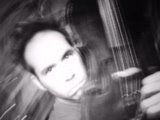
Here's a review from last year from the site "Fake Jazz". The title of this post is a link to it.
I'm glad the writer focused on the light and shadow aspects of the music... something i was getting at with the song titles, which were adapted from a very old book about dream symbolism and interpretation. If music can sound like light and shadow, I think this record does.
-------------------
Empty House Cooperative - Painted Plane (Sedimental)
The Empty House Cooperative is a loose collective of musicians that originally came together in 1997 to jam and eat Sunday brunch at the home of David Michael Curry in Cambridge, MA. Over the years, membership in EHC has varied, but at any one time one might find members of Molasses, Thalia Zedek, Consonant, Pullman, Boxhead Ensemble, Willard Grant Conspiracy, Godspeed You! Black Emperor, and The New Year joining forces to create open-ended melodic improvisations.
The recordings that make up "Painted Plane" feature a small, but core subset of EHC recorded live in the studios of WMBR in Cambridge MA in 2000. This time out, EHC was comprised of David Michael Curry (viola, horn, loop samples, guitar, and pocket watch), Chris Brokaw (guitar), and Jonah Sacks (cello). The session had been originally released by Hinah in France as a limited edition of 50 in 2001, but "Painted Plane" reissues these recordings with new mastering and editing.
EHC's improvisational style on "Painted Plane" is informed by a keen working knowledge of how music maps to emotional narrative elements and the band manipulates those elements with a sure hand. For EHC, melody signifies peace and/or joy while dissonance is employed whenever emotions turn negative. This is a fairly traditional mapping of musical techniques onto the emotional landscape but EHC is a practitioner par excelllence. EHC's background in scoring silent cinema and live dance performances is in evidence. Their adherence to classic rules of scoring narrative performance provide an entry point for listeners who might find completely free improvisation too abstract. In fact, for all of the improvisational elements at play in "Painted Plane", it resembles nothing less than an elaborate Papier-Mâché construction. Layers of easily legible print on paper (DMC's swelling and often euphoric melodies) on top of a sinewy chicken wire frame (Brokaw's guitar) slathered with and held together by the glue of Sacks' cello's throaty growl.
To ground the music in familiar territory, all of the titles refer in some way to different interactions of light and shadow and their emotional impact. In the opening track ("sun rising: great advancement"), you can hear the optimism in the first soaring notes of DMC's trumpet. The trumpet becomes a signal of hope throughout the session often piercing the veil of a swarming dense tangle of strings to burst through like the first blossoms of Spring.
To counterbalance this glee, EHC next offers "setting: disappointed hopes" as the bookend of the day's hopeful beginnings. Here, harshly bowed cello plays shadow, the spoiler of hope. The clangor speaks of desperation and bitterness, of frustrated dreams. All the while Brokaw's guitar chimes in the background eventually calming the wails until a trumpet floats in on wings of elegant melancholy. This grows to a nucleus of white hot determination to guarantee that the shadows are but temporary obstructions to joy. The piece finishes with a weary and beleaguered hope tempered by life's obstacles.
The next two pieces form a softer, less aggressive centerpiece and continues the theme that despite the omnipresent spectre of imminent defeat looming just out of earshot, the life force will always triumph. In "early lilacs", after lurking in the shadows for half an hour, Brokaw proves himself a more equal partner as he comes forward from his position in the background and becomes more audible. This enhances his role as the anchor of the group and a gritty foil to the melodic flights of DMC. The following "early violets" could be a chamber music take on Godspeed You! Black Emperor and it is clear why members of that group find themselves under EHC's broader umbrella. To round the session out, "eclipse: omen of worry and fear" develops a palpable sense of unease and "bright sunlight: discovery of secrets" shines the spotlight again on Brokaw's nuanced contributions.
The cover for "Painted Plane" shows a sunrise (maybe it's a sunset but given the prevailing optimism of the recording, I'm going with sunrise), saturated with brilliant color and conveying a sense of near limitless space. At all points in "Painted Plane"'s harrowing journey, emotions are always close to the surface and unguarded. EHC is nothing if not direct and their command of dynamics is impressive. This is evident in tracing the trajectory of any of the pieces, even the shorter ones. Yet for all of the vigor and freshness of their playing, EHC never loses sight of the story they are telling, and of their role as narrators in the play of light and shadow.
review by steve rybicki at 04:03 PM April 01, 2005

No comments:
Post a Comment